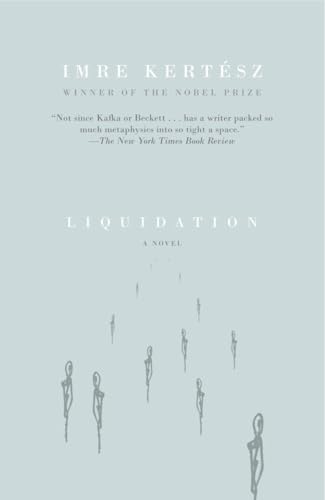Liquidation
Imre Kertész
BOOK REVIEW

In the labyrinth of post-Holocaust literature, Liquidation by Imre Kertész emerges as a stark reflection on identity, trauma, and memory. It isn't just a novel; it is a relentless pursuit of truths buried beneath layers of societal amnesia. Kertész, a survivor of Auschwitz, does not shy away from the dark recesses of human experience, and through this gripping narrative, he invites you to confront the very essence of existence in a world scarred by the shadows of the past.
Set against the haunting backdrop of a post-Communist East Europe, Liquidation dares you to question the morality of forgetting. The protagonist, a writer embroiled in the complexities of heritage and survival, finds himself on a mission to laugh in the face of the silence that follows tragedy. You won't just be reading his struggles; you will feel the weight of an entire community pushing back against the tide of historical erasure. It's a battle that resonates not only within the pages but also reverberates with the voices of those who, like Kertész, have been branded by the horrors of history.
As you traverse the landscape of this novel, Kertész's prose cuts with surgical precision. It is laced with irony and dark humor, drawing you into a dance where laughter mixes with tears. Every page becomes a mirror reflecting your own sense of identity and the collective memory of humanity. The narrative is provocative, compelling, and at times, uncomfortably intimate. You might find yourself grappling with your own reflections as Kertész deconstructs the idea of belonging within a society that has sought to define it through trauma.
Critics have varied in their responses to this work, with some lauding Kertész for his bold stance on identity politics, while others argue that the novel's complexity can be alienating. Yet, isn't that the hallmark of great literature? To provoke thought and elicit emotions that force you to confront uncomfortable truths? Many readers have vocalized a transformative experience, acknowledging how Liquidation compelled them to reevaluate their understanding of freedom and responsibility in the wake of collective trauma. The reviews are replete with a mixture of admiration and bewilderment - the hallmark of a work that doesn't cater to complacency.
Kertész's reflections cut deeper than mere narrative; they are a call to engage with the past, to resist the seductive comfort of forgetting. The importance of Liquidation lies in its ability to make you confront the essence of existence in a world where history is often rewritten-sometimes at a profound cost. The question Kertész poses is not just about individual identity but about collective memory and the responsibilities that come with it.
This book doesn't just challenge you; it demands that you take action, to explore the contours of your own identity and the impact of history on your life. As you dive into this intricate tapestry woven from threads of personal loss and societal decay, you will emerge with a scarred but deeper understanding of what it means to be human. The urgency of Kertész's message is loud and clear: in a world too eager to forget, it is our duty to remember.
Don't let Liquidation slip through your fingers-it's not just a story. It's an awakening. Embrace the turmoil, engage with the narratives that shape us, and allow Kertész's haunting prose to linger in your thoughts long after you turn the last page. The heart of this novel will carve a space in your psyche, igniting conversations that transcend generations. You owe it to yourself to step into this unflinching exploration of identity and memory, emerging forever changed. 📚
📖 Liquidation
✍ by Imre Kertész
🧾 129 pages
2005
#liquidation #imre #kertesz #ImreKertesz